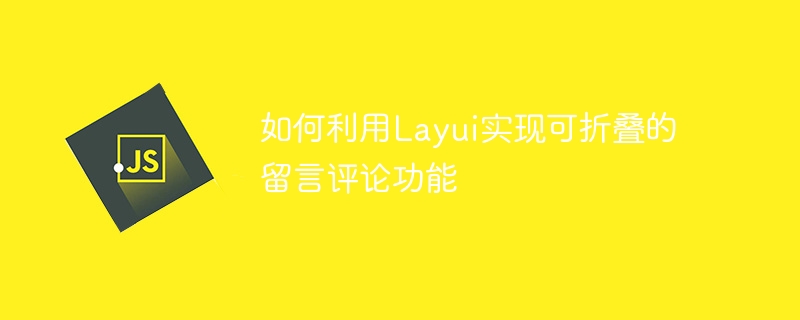Home >Web Front-end >JS Tutorial >How to use Layui to implement foldable message comment function
How to use Layui to implement foldable message comment function
- WBOYWBOYWBOYWBOYWBOYWBOYWBOYWBOYWBOYWBOYWBOYWBOYWBOriginal
- 2023-10-27 14:24:141283browse

How to use Layui to implement the foldable message comment function requires specific code examples
Introduction:
In modern web design, the message comment function is a A relatively common function. Implementing a foldable message comment function can effectively reduce the space occupied by the page and make the page more tidy and beautiful. This article will introduce how to use the Layui framework to implement the foldable message comment function and provide specific code examples.
1. Environment preparation
- Installing Layui
Layui is a front-end UI library developed based on jQuery. It provides rich UI components and simple API, which is very suitable for use. To build the message comment function. - Introduce necessary resource files
Introduce Layui’s core files and style files into the HTML file:
<link rel="stylesheet" href="path/to/layui/css/layui.css"> <script src="path/to/layui/layui.js"></script>
2. Implementation ideas
To implement foldable messages For the comment function, you can use Layui's panel component. Each message or comment is displayed in a panel. Click the header of the panel to expand or collapse the panel content.
3. Code Example
The following is a simple HTML code example:
<div class="layui-container">
<div class="layui-row">
<div class="layui-col-md8">
<div class="layui-collapse">
<div class="layui-colla-item">
<h2 class="layui-colla-title">留言1</h2>
<div class="layui-colla-content">
<p>这是留言1的内容</p>
</div>
</div>
<div class="layui-colla-item">
<h2 class="layui-colla-title">留言2</h2>
<div class="layui-colla-content">
<p>这是留言2的内容</p>
</div>
</div>
<div class="layui-colla-item">
<h2 class="layui-colla-title">留言3</h2>
<div class="layui-colla-content">
<p>这是留言3的内容</p>
</div>
</div>
</div>
</div>
</div>
</div>In the above example, Layui's panel component is used, by adding .layui -colla-item class to define the panel item of each message, .layui-colla-title class to define the header style of the panel, .layui-colla-content Class to define the content style of the panel. Click the panel header to expand or collapse the panel content.
4. Refinement of style and interaction
The above code example only implements the basic foldable message comment function. In order to better present the page effect, the style and interaction can be further refined. deal with.
- Style customization
According to your own needs, you can customize the style of the panel header and content, such as modifying the font, background color, etc. - Add animation effects
You can use the animation effects provided by Layui to add transition effects to the expansion and collapse of the panel to make the page smoother. - Dynamicly generate messages
If you need to dynamically generate message comments, you can use Layui's dynamic rendering function to pass the message data into the template to generate the corresponding HTML code.
Summary:
This article introduces how to use Layui to implement the foldable message comment function, and provides specific code examples. By using Layui's panel component, we can easily implement the expand and collapse functions of page comments, making the page more tidy and beautiful. At the same time, we can further refine the style and interaction according to our own needs to improve the user experience.
The above is the detailed content of How to use Layui to implement foldable message comment function. For more information, please follow other related articles on the PHP Chinese website!

